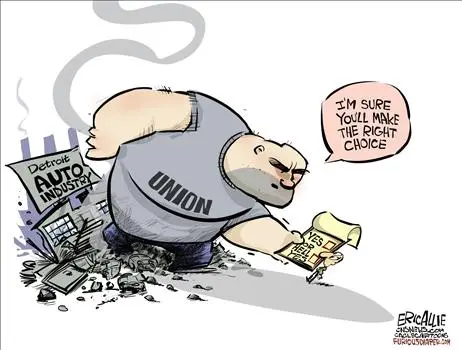Pending Supreme Court Case ‘Challenges President Obama’s Right to Make Up His Own Rules’

Rex Obama and SCOTUS’ Labor Pains : The Freeman : Foundation …

Among the four apparently illegal “recess” appointees President Obama installed on the National Labor Relations Board during his first term in office, three have been manifestly hostile to independent employees’ freedom to resist unionization, either individually or collectively. Image: Eric Allie/Cagle Cartoons
It seems incredible that two and a quarter centuries after the Constitution was ratified, it is falling upon the U.S. Supreme Court this fall to determine whether or not the National Labor Relations Board (NLRB) and other federal agencies may, if they are illegally constituted, “continue to function after a circuit court of appeals has declared it unconstitutional to do so.”
However, as pro-Right to Work economist Charles Baird, a professor emeritus at California State University, East Bay, points out in a recent commentary for The Freeman (see the link above), that is in fact one of the key issues in NLRB v. Noel Canning, a case scheduled to go before the High Court October 7.
The Noel Canning case is a consequence of Big Labor President Barack Obama’s decision, back in January 2012, to please Big Labor officials by installing two zealous proponents of monopolistic unionism on the NLRB without first allowing the U.S. Senate to exercise its constitutional authority to consider the nominations. The President put union lawyer Richard Griffin and ex-Ted Kennedy aide Sharon Block on the NLRB as “recess” appointments, even though the Senate was not by its own understanding in recess at the time.
Yet another “recess” appointment illegally made by the President in January 2012, management attorney Terrence Flynn, left the board later that year, and he did not figure in the Noel Canning case.
In late 2012, the U.S. Court of Appeals for the D.C. Circuit agreed to hear an appeal of an unfavorable NLRB ruling sought by the Noel Canning Pepsi bottling firm. Noel Canning contended, in part, that the NLRB lacked a legal quorum when it rendered its decision, because the “recess” appointment were not valid. In January 2013, the appeals court agreed with this contention.
As Baird explains, the appeals court found not only that the President has no constitutional power to make “recess” appointments when the Senate is not in a recess as defined by the Constitution. It also found that the President may not exercise this prerogative even during genuine recesses unless they occur between sessions of Congress. If this understanding is correct, then President Obama’s 2010 “recess” appointment of union lawyer Craig Becker to the NLRB was also unconstitutional, as another federal appeals court has since determined. These two rulings challenge “President Obama’s right to make up his own rules, whenever he likes, despite the Constitution and Congress’ procedural rules,” writes Baird.
Next month the Supreme Court will hear the NLRB’s appeal of the D.C. Circuit’s decision. The ultimate outcome of the Noel Canning case will not affect the current make-up of the NLRB, because this summer Big Labor Senate Majority Leader Harry Reid successfully intimidated a handful of Senate Republicans into cooperating with the chamber’s union-label Democrats to rubber-stamp five Obama NLRB nominees for extended terms. (Prior to the Senate showdown, both Griffin and Block remained on the NLRB for months and participated in deciding hundreds of cases, despite the D.C. Circuit’s finding that they were not legal members of the board.)
Baird argues convincingly in his conclusion that Noel Canning “remains relevant”:
The fact that there is now a full slate of Senate-confirmed NLRB members does not render the issues involved in Noel Canning moot. It is true that even if SCOTUS upholds the D.C. circuit’s decision, all of the 1,200 invalid decisions between January 4, 2012, and July 30, 2013, can simply be reimposed by the new board. Nevertheless, the high court will decide whether any NLRB (or other executive agency) that is illegally constituted may continue to function after a circuit court of appeals has declared it unconstitutional to do so.
Finally, SCOTUS’ decision will define the limits to any President’s ability to make future recess appointments, not only to the NLRB, but also to any other federal agency or court. Given Obama’s propensity to do things on his own if Congress doesn’t bow to his commands, circumscribing his recess appointment power would be no small victory.

